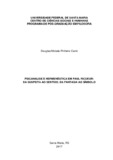| dc.creator | Carré, Douglas Moisés Pinheiro | |
| dc.date.accessioned | 2018-05-09T12:25:48Z | |
| dc.date.available | 2018-05-09T12:25:48Z | |
| dc.date.issued | 2017-03-27 | |
| dc.identifier.uri | http://repositorio.ufsm.br/handle/1/13140 | |
| dc.description.abstract | This research shows how Paul Ricoeur (1913-2005) incorporates some concepts
and, above all, the spirit of freudian psychoanalysis to the hermeneutic philosophy.
Ricoeur notes that there is, in Freud, a hermeneutic of suspicion that puts at risk the
whole philosophy and culture that had been built and founded on the certainty of
Cartesian cogito. Our author believes the passage by Freud, accepting his questions
and incorporating his learning, is imperative to Philosophy and to the contemporary
philosopher. However, Ricouer does not only invite us to suspicion but also invites us
to hear it. The conflict between the hermeneutics of suspicion and the restoration of
meaning, is the intent of our philosopher, namely: reaching a second moment of
interpretation, a second innocence in and by the critics. If there is a school of
suspicion, there is also of confidence, belief and faith. Freud, Nietzsche and Marx
lead Ricoeur to suspicion, however it goes beyond, because he wants to see emerge
a post-critical faith able to comprehend the questions, above all, Freudianism,
allowing them to question the point of reducing the masks and the illusions of
consciousness so that the sense comes. The proposal of Ricoeur is then left for a
hermeneutics of the symbol that assumes the passage by critics of the masters of
suspicion and that is a real bug in symbol, but now, no more naive and based on
immediate consciousness, bearing and donor of sense, but a critical and instructed
listening that takes into account the reflections and the discoveries of psychoanalysis
of Freud. At the end of our research we will cover some classical texts of Freud who
plays the basic themes of religion, in order to read them from Ricoeur and his
interpretative dialectic, aiming at elucidating more explicitly as our philosopher
incorporates the suspicion to the hermeneutics of the restoration of meaning. | eng |
| dc.description.sponsorship | Coordenação de Aperfeiçoamento de Pessoal de Nível Superior - CAPES | por |
| dc.language | por | por |
| dc.publisher | Universidade Federal de Santa Maria | por |
| dc.rights | Attribution-NonCommercial-NoDerivatives 4.0 International | * |
| dc.rights.uri | http://creativecommons.org/licenses/by-nc-nd/4.0/ | * |
| dc.subject | Paul Ricoeur | por |
| dc.subject | Hermenêutica | por |
| dc.subject | Psicanálise | por |
| dc.subject | Símbolo | por |
| dc.subject | Religião | por |
| dc.subject | Hermeneutics | eng |
| dc.subject | Psychoanalysis | eng |
| dc.subject | Symbol | eng |
| dc.subject | Religion | eng |
| dc.title | Psicanálise e hermenêutica em Paul Ricoeur: da suspeita ao sentido, da fantasia ao símbolo | por |
| dc.title.alternative | Psychoanalysis and hermeneutics in Paul Ricoeur: from the suspicion to the sense of fantasy to the symbol | eng |
| dc.type | Dissertação | por |
| dc.description.resumo | A presente investigação mostra como Paul Ricoeur (1913-2005) incorpora alguns
conceitos e, sobretudo, o espírito da psicanálise freudiana à filosofia hermenêutica.
Ricoeur nota que há, em Freud, uma hermenêutica da suspeita que coloca em
xeque toda a filosofia e a cultura que vinham sendo construídas e alicerçadas sobre
a certeza do cogito cartesiano. Nosso autor acredita que a passagem por Freud,
aceitando seus questionamentos e incorporando seu aprendizado, é imprescindível
à filosofia e ao filósofo contemporâneo. Porém, Ricoeur não nos convida somente à
suspeita, ele nos convida, também, a ouvir. No conflito entre a hermenêutica da
suspeita e a da restauração do sentido, está o intento de nosso filósofo, a saber:
chegar a um segundo momento da interpretação, a uma segunda inocência na e
pela crítica. Se há uma escola da suspeita, há também uma da confiança, da crença
e da fé. Freud, Nietzsche e Marx conduzem Ricoeur a suspeita, contudo ele vai
além, pois quer ver emergir uma fé pós-crítica capaz de abarcar os
questionamentos, sobretudo, do freudismo, deixando-se por eles questionar a ponto
de reduzir as máscaras e as ilusões da consciência para que sobrevenha o sentido.
A proposta de Ricoeur é, então, partir para uma hermenêutica do símbolo que
suponha a passagem pela crítica dos mestres da suspeita e que seja, assim, uma
verdadeira escuta do símbolo, porém, agora, não mais ingênua e alicerçada sobre a
consciência imediata, portadora e doadora de sentido, mas uma escuta crítica e
instruída que leve em conta as reflexões e as descobertas da psicanálise de Freud.
Ao final de nossa pesquisa iremos abordar alguns textos clássicos de Freud que
tocam temas basilares da religião, com o intuito de lê-los a partir de Ricoeur e de
sua dialética interpretativa, buscando elucidar mais explicitamente como nosso
filósofo incorpora a crítica da suspeita à hermenêutica da restauração do sentido. | por |
| dc.contributor.advisor1 | Rossatto, Noeli Dutra | |
| dc.contributor.advisor1Lattes | http://lattes.cnpq.br/2947312243186882 | por |
| dc.contributor.referee1 | Castro, Fabio Caprio Leite de | |
| dc.contributor.referee1Lattes | http://lattes.cnpq.br/6516490021035286 | por |
| dc.contributor.referee2 | Krassuski, Jair Antonio | |
| dc.contributor.referee2Lattes | http://lattes.cnpq.br/5559214547314711 | por |
| dc.creator.Lattes | http://lattes.cnpq.br/6552745207851894 | por |
| dc.publisher.country | Brasil | por |
| dc.publisher.department | Filosofia | por |
| dc.publisher.initials | UFSM | por |
| dc.publisher.program | Programa de Pós-Graduação em Filosofia | por |
| dc.subject.cnpq | CNPQ::CIENCIAS HUMANAS::FILOSOFIA | por |
| dc.publisher.unidade | Centro de Ciências Sociais e Humanas | por |



